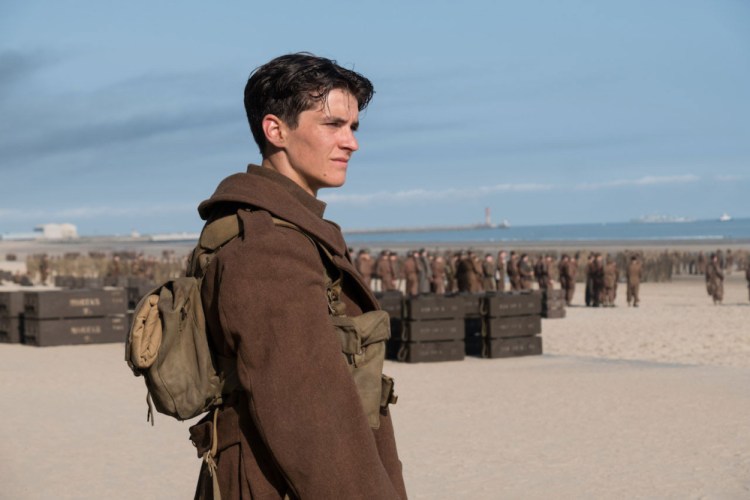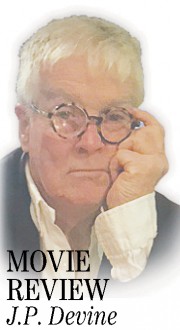For those of you under the age of 50, Dunkirk is a beach town in France, where in the spring of 1940, the unthinkable happened. This stunning mass of young and not so young soldiers are fleeing the onslaught of German troops with their huge Panzer tanks and massive army that had pushed them south to this beach.
Nolan adds to this mile-long canvas a line of brown coated British soldiers, waiting at the edge of the English Channel to board a large boat floating nervously in the harbor.
They know they can’t all get on. The soldiers seem to stand in silence, almost afraid to speak or move.
Then the German Luftwaffe with its deadly fire power comes screaming in, bombing and strafing the helpless voyagers.
There is no place to run, no place to hide, no coves or rocky caves, only the beach. It’s gory, frightening and difficult to watch.
History tells us that it was Hitler’s plan to dispatch his mighty Panzer tank divisions, fighter planes and bombers to annihilate the waiting troops, each of them, one by one, dozens by dozens, until he had completely wiped out the British forces.
The result would have been disastrous, and possibly have forced the capitulation of the British Empire.
With all of that at stake, the officers in charge of those troops dug in and waited for British ships to rescue them.
But the big, lumbering tankers coming to help are floating targets for the lurking German U-Boats.
“Dunkirk” begins with six or seven British soldiers wandering through the village, picking up bits of food and wine through broken windows. Suddenly gun fire breaks out. There is flight, panic, desperation, as all but one, Tommy (Fionn Whitehead) is cut down, so he runs and in his panic, drops his weapon.
Back in England, the word of the trapped men spreads, and everyone on the coasts and up the Thames who has a boat loads up with food and water and medicines and sets out for Dunkirk.
And so begins the greatest rescue mission in the history of warfare.
A sea of small and large boats, 25 footers to huge yachts — a modern naval fleet of crafts, races against time. These civilians, common everyday Brits, some veterans of the first war, head out at once in the darkness of early morning. Nolan takes us aboard one such craft, a tiny wood and metal yacht named Moonstone, and introduces us to the archetypcal Englishman rescuer, a simple man, a shopkeeper with no choice but to steer his tiny craft into the thundering maw of the Nazi death machine. This man (played by the Oscar winner Mark Rylance) and his son (Tom Glynn-Carney) can probably rescue no more than 10 or 12 troops.
But soon they find themselves joined by the amazing civilian sailors, bonded together by the great British fighting spirit.
Along the way they will pick up a lone survivor (Cillian Murphy) stranded on a sinking boat, wet and shell shocked, who will bring with him bad luck.
There will be other stories, of courage and cowardice, heroism and desperation.
The cast is perfect, Fionn Whitehead, the first we see, who with few words, leads us deeper into the quagmire, to Mark Rylance, Kenneth Branagh, James D’Arcy, and a heroic Spitfire pilot (Tom Hardy) who refuses to get back to England for refueling, but stays in the sky above the legions of the seemingly lost.
With his fuel running out and the gauge busted, he fights off one German plane after another while the beleaguered below, and those of us in the theatre, cheer him on. Among so many moments, this one is magical.
Nolan’s “Dunkirk” is a reminder that behind us in centuries of history, there were defenders of freedom, real heroes, who walked this planet without magic shields or ray guns, and sometimes without hope, saved democracy.
Enormous praise must be given to Hoyte Van Hoytema’s phenomenal camera.
And Hans Zimmer, (“The Crown,” “Genius”) once again presents an inspiring score.
J.P. Devine, of Waterville, is a former stage and film actor.
Send questions/comments to the editors.



